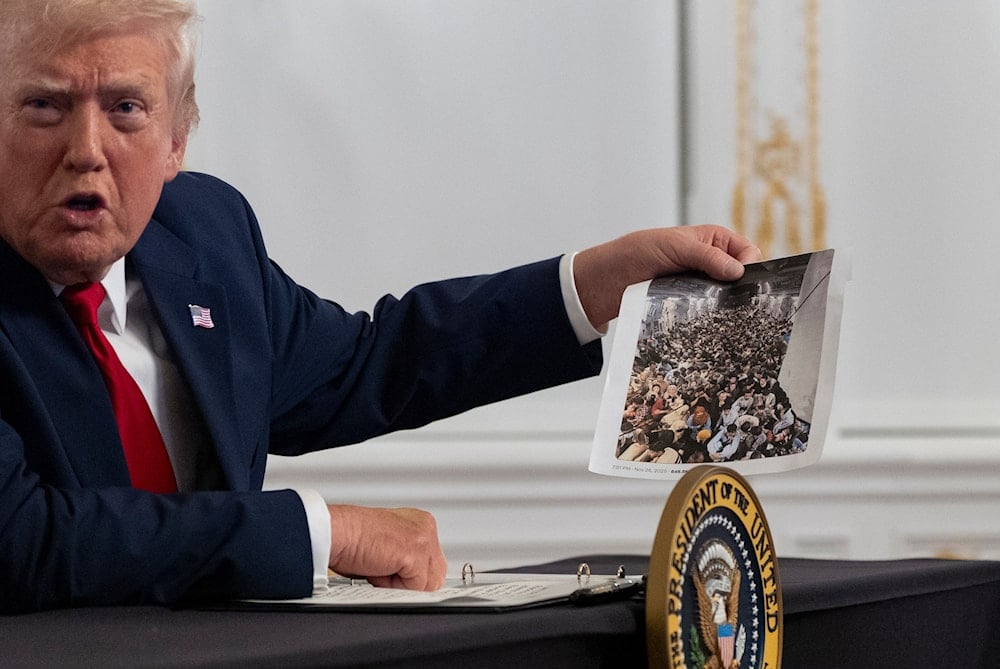Trump to 'permanently pause' migration from 'third world countries'
Trump's proposed policy targets 19 nations, sparking legal concerns over vague terminology and collective punishment.
-

US President Donald Trump holds up a photograph as he speaks to reporters after speaking to troops via video from his Mar-a-Lago estate on Thanksgiving, on November 27, 2025, in Palm Beach, Fla. (AP Photo/Alex Brandon)
US President Donald Trump announced on Thursday that his administration will implement an indefinite suspension of migration from what he termed "Third World Countries," a sweeping policy shift triggered by a fatal shooting near the White House the day before.
The directive follows an attack on November 26 that left two West Virginia National Guard members shot in Washington, DC. Specialist Sarah Beckstrom succumbed to her injuries on Thursday, while Andrew Wolfe remains hospitalized in critical condition.
Authorities identified the suspected shooter as Rahmanullah Lakanwal, a 29-year-old Afghan national. Records indicate that Lakanwal entered the United States in September 2021 through Operation Allies Welcome during the Biden administration's Afghanistan withdrawal. However, government files show he was granted asylum status in 2025 under the current Trump administration's Department of Homeland Security.
In a statement posted on Truth Social, Trump declared he would "permanently pause migration from all Third World Countries to allow the US system to fully recover." The president did not specify which nations would fall under this classification or provide a timeline for the suspension; however, he indicated the policy would include reviewing cases approved during the Biden administration.
On another note, earlier on Thursday, US Citizenship and Immigration Services Director Joseph Edlow stated the administration would conduct "a full-scale, rigorous reexamination" of Green Card holders from designated countries of concern. USCIS also immediately suspended all immigration applications from Afghan nationals on Wednesday night.
19 countries face heightened scrutiny
According to administration guidance, the review will focus on 19 nations previously identified in Trump's June proclamation on national security threats. These include Afghanistan, Iran, Libya, Somalia, Sudan, Yemen, and several other countries facing full entry restrictions, plus partial limitations on nationals from Cuba, Venezuela, and six other nations.
US President Donald Trump has signed a new travel ban effective June 9, 2025, prohibiting entry to the United States from 12 nations: #Afghanistan, Myanmar, Chad, the Republic of the Congo, Equatorial Guinea, Eritrea, Haiti, #Iran, Libya, Somalia, #Sudan, and #Yemen.
— Al Mayadeen English (@MayadeenEnglish) June 5, 2025
An… pic.twitter.com/WYsoKKF3CV
Trump's directive also includes plans to terminate federal benefits for non-citizens, deport individuals considered security risks, and pursue denaturalization for migrants who "undermine domestic tranquility." The administration aims to remove anyone deemed not a "net asset to the United States" or "non-compatible with Western civilization."
Legal experts and civil rights organizations have raised multiple concerns about the announcement. Critics argue the term "Third World" lacks a legal definition and represents discriminatory policy reminiscent of previous travel bans.
Trump’s new travel ban is here, but it’s not just a repeat of 2017.
— Al Mayadeen English (@MayadeenEnglish) June 26, 2025
The 2025 travel ban expands the scope of Trump’s original “Muslim ban,” targeting 19 countries across Africa, Latin America, and Asia, not just Muslim-majority states. It’s broader and more legally strategic.… pic.twitter.com/B1xESEppvX

 3 Min Read
3 Min Read








